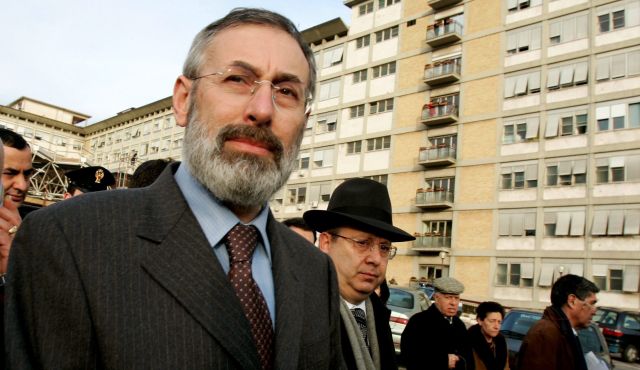Response to papal peace meet reveals rifts in Italian Jewry
More recently, in an interview published in the June edition of Pagine Ebraiche – a Jewish monthly magazine – Di Segni criticized the joint prayer meeting for peace at the Vatican, which he described as “puzzling and even dangerous.”
Jun 11, 2014

MILAN: While Pope Francis hosted Shimon Peres and Mahmoud Abbas in an interfaith prayer meeting at the Vatican on Sunday, one religious figure was missing from the Christian, Muslim and Jewish leaders: Rome’s chief rabbi, Riccardo Di Segni.Di Segni, arguably the country's most prominent rabbi, had been invited to attend the session with the Israeli and Palestinian presidents, in the Vatican gardens, but declined, citing “other commitments” outside the city.
His absence was noted by Italy’s national media, which rarely cover Jewish issues: “Santa Marta [the Vatican main’s guest house] hosted the whole world, but Rome’s rabbi wasn’t there,” Corriere della Sera, one of the country’s two major newspapers, reported on Monday.
Il Foglio, a small but influential right-wing daily that often criticizes the pope from a conservative Catholic perspective, published a front-page article the same day, commending Di Segni’s decision not to attend.
In the past Di Segni has voiced skepticism concerning Jewish dialogue with the Vatican. Indeed, in an interview with Haaretz last month, he argued that “from the theological point of view," Catholics and Jews "have nothing to discuss,” although he added that he favors “good neighborly relations.”
More recently, in an interview published in the June edition of Pagine Ebraiche – a Jewish monthly magazine – Di Segni criticized the joint prayer meeting for peace at the Vatican, which he described as “puzzling and even dangerous.”
In particular, he objected to the fact that Peres, a secular politician, was invited to a religious event: "[Peres] does not appear to be a regular visitor to places of worship, and I’d be surprised if he’d become one because of the pope,” the rabbi said.
In the interview in Il Foglio, Di Segni said that if he hadn’t had other commitments, he would have attended the session “as a mere observer,” and also noted that he had been invited to the Vatican by Peres, not Francis.
The Italian Rabbinate appears to be quite divided when it comes to the relationship with the Catholic Church. While until recently few were willing to discuss the topic publicly, a growing number of rabbis who disagree with Di Segni are becoming vocal about it.
For example, in the same issue of Pagine Ebraiche, Florence’s chief rabbi, Dr. Joseph Levi – who was present at the interfaith service on Sunday, unlike his Roman counterpart – praised the pontiff's efforts to promote interfaith dialogue. He warned that “if we were not to respond to the messages sent by the pope, it would be a mistake.”
Florence does not have a large Jewish community – most of Italy’s Jews are concentrated in Rome and Milan – but Israeli-born Levi, a former president of the Israeli Rabbis for Human Rights NGO, is considered particularly interested in interreligious issues.
It is not clear whether he was invited to the prayer meeting this week by the pope himself or by David Rosen, the director of interreligious affairs at the American Jewish Committee, who is believed to be one of Francis’ privileged interlocutors when it comes to Jewish issues.
Giuseppe Momigliano, the recently elected president of Italy’s Rabbinic Assembly, also praised Sunday's event, which he described in Pagine Ebraiche as a “special gathering [of Catholics] with Israel and the Jewish world.”
Last month, ahead of Francis’ visit to the Middle East, Momigliano gave an interview to Rome’s Il Messaggero newspaper, in which he commended the pope for visiting Theodor Herzl’s tomb and traveling in the company of a rabbi and a Muslim leader (Abraham Skorka and Omar Abboud, respectively).
Momigliano was not invited to the interfaith service this week, presumably because Italy’s Rabbinic Assembly currently has no direct channels of communication with the Vatican.
This may seem like a paradox, since the rabbis heading the assembly have traditionally been more keen on religious dialogue than others: Before Momigliano, the organization was headed by Giuseppe Laras – the now-retired former chief rabbi of Milan – who had been one of the earliest proponents of Judeo-Christian dialogue back in the 1980s.
Among others who attended the event this week were Renzo Gattegna, president of the Comunità Ebraiche Italiane, the national umbrella organization of Italian Jewry, and Riccardo Pacifici, head of Rome’s Jewish community.
In Italy's Jewish community, relations with the Vatican have been traditionally dealt with as a local issue – as if the pope were Rome’s bishop (which, technically speaking, he is) rather than leader of the world's Catholic Church.
According to this logic, it is incumbent upon the rabbi of Rome to maintain ties and communicate with the pontiff. One wonders, however, what happens when that rabbi seems to be less interested than other Italian rabbis in talking to the pope.--Haaretz.com







Total Comments:0